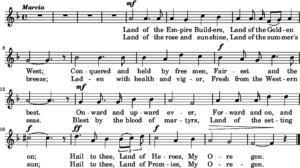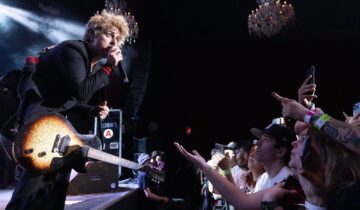 For the ECONOMIST: ANYONE who has searched for song lyrics on the web in the past decade has probably landed on a cheap, awfully-designed website full of annoying ads, with no proof of lyric accuracy. Those sites were surely unlicensed, because until recently no serious apparatus was in place to issue licenses, let alone police them.
For the ECONOMIST: ANYONE who has searched for song lyrics on the web in the past decade has probably landed on a cheap, awfully-designed website full of annoying ads, with no proof of lyric accuracy. Those sites were surely unlicensed, because until recently no serious apparatus was in place to issue licenses, let alone police them.
That has changed. Lyrics are now largely available at the point of music consumption, integrated into music services and devices, in real time with music listening. For fans, this allows for deeper dives into the meaning of music. More importantly, many of the lyrics in use are now being acquired through proper licenses, which means royalties are more likely to make their way to whoever owns the rights to those words.
Many fans may not realise that lyrics are copyrighted. But lyrics essentially function in the same way as poetry—as the Nobel prize committee acknowledged by giving this year’s literature award to Bob Dylan. Music lovers can no more copy and share an albumful of lyrics than poetry aficionados can do the same with a volume of Seamus Heaney.
Partnerships have emerged that make lyric sharing legitimate. Google signed a multiyear licensing deal in June with LyricFind, a Toronto-based company, to display licensed lyrics prominently in Google search results. In August, Genius—a web-annotation company that allows users and artists to comment on, provide analysis and offer context for lyrics, political speeches, literature and other pieces of text—signed a partnership with Spotify. It’s a revamped, modern version of the 1990s VH1 show “Pop Up Video”, in which bubbles containing “information nuggets” both factual and humorous, would pop up on the screen as music videos played. In Spotify, as the song “Down in the DM” by Yo Gotti plays, listeners can now see commentary from the artist himself, such as “I recorded ‘Down in the DM’ in 15, 20 minutes max, at DJ Khaled’s studio in Miami.” This is the type of small, behind-the-scenes detail that curious fans crave.
These partnerships are important. Spotify has approximately 100m active users—up from 75m last year—30m of whom are paying subscribers. That’s a lot of clicking on lyrics that are properly licensed, which means proper royalties. LyricFind has 4,000 users and more than 1m lyrics licensed legally in eight languages, according to Darryl Ballantyne, its founder and CEO. The company doesn’t release exact royalty payment numbers, but pays millions to lyrics publishers each year. This will dramatically increase with the Google deal, he says. “We were disappointed with what was out there,” Mr Ballantyne said. “We knew there was a need, and knew there was a technological solution to open up a revenue stream.”
Genius says that it acquires only properly-licensed lyrics, so any of Spotify’s 10m users worldwide who click on Genius-sourced lyrics are in theory helping send royalty checks to those rights holders. “Lyrics are and have always been one of the top search categories across the entire internet, right up there with news and porn,” said Ben Gross, director of business development for Genius. “But lyrics were treated as a sideshow on low-rent websites, surrounded by ringtone ads. We wanted to correct that.”
What is the true value of a lyric in cold cash? And how do you stop people making off with them? Royalties for lyrics are largely determined by agreements negotiated between the rights holders and licensee. The policing of lyric-sharing in America is largely up to the National Music Publishers Association (NMPA), a trade body that, since 2006, has represented a large part of the market and can make big blanket licensing deals. The NMPA goes after unlicensed sites, demanding that they buy licenses or remove unlicensed content. Lawsuits are filed if no action is taken. But anyone can still throw song lyrics up on Facebook without the lyric police knocking on your door.
Three years ago, David Lowery, the leader of two American bands, Camper Van Beethoven and Cracker, and now a lecturer at the University of Georgia, released a damning report on lyric-focused sites like Rap Genius—the former name of Genius—that had been posting unlicensed lyrics. The NMPA issued takedown notices to the 50 companies named, and there was talk of a lawsuit. Within six months, some of the smaller sites named on the list were shut down, but major players like Rap Genius went the other way, and licensed up. Today Mr Lowery is now a verified artist within the Genius community, where he recently annotated his most recent project: a long form ballad-form poem called “Conquistador”.
Mr Lowery says he receives between $500 and $5,000 per annum from lyric royalties. He posted the 2013 report for the benefit of artists for whom every revenue stream matters, and who probably never received much lyrics revenue before. “Even if it is small amounts, that’s still a net positive,” he says.
For the first time in more than a decade, the American music business grew for the first half of 2016, mainly due to subscription services like Spotify, Apple Music and Tidal. But the people who own lyrics—songwriters and publishers—are typically considered a separate entity from the recordings of those songs, which is what subscribers are paying for: the rights-holder to the recording will be paid, but not the rights-holder of the lyrics, unless they are being displayed alongside. Lyrics need their own isolated clicks or views to generate revenue.
Companies are finding other clever ways to bundle lyrics with other services, and to turn that into revenue. The app Shazam, which lets users hold a smartphone up to a source of music to identify the song and artist, has been in business for 15 years, and began displaying lyrics in 2011 through a partnership with LyricsFind. But Shazam turned its first profit only this year, thanks to advertisers who pay to use Shazam’s image-recognition and sound-recognition technology in marketing campaigns that typically have nothing to do with music discovery or lyrics. And Genius raised tens of millions in funding as it rebranded itself two years ago, and moved well beyond music to include all texts, including President Obama’s State of the Union addresses.
Which of these approaches will succeed in the long run remains to be seen, but the future of licensed lyrics will surely float on the broader successes of the companies that display them. That would be good news for the creative souls who originally wrote them.



